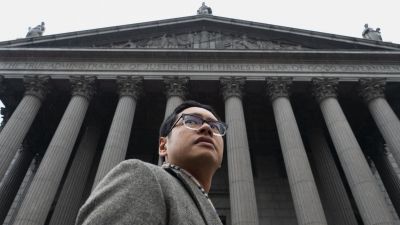
Melania Trump, Donald Trump, Georgina Chapman and Harvey Weinstein attend the after party of the New York premiere of NINE at the M2 Ultra Lounge on Dec. 15, 2009 in New York City. (Photo by Stephen Lovekin/Getty Images for The Weinstein Company)
This past week, with the revelations about disgraced former Miramax and Weinstein Company head and serial sexual predator Harvey Weinstein, it has been impossible to ignore the correspondences between Hollywood and Washington, where another sexual predator now occupies the Oval Office. Hollywood has always been something of a den of iniquity commanded by aggressive satyrs, and Washington’s movers and shakers have long taken a page from that den. Powerful men will be powerful men, which means that they will likely exploit, harass and abuse women.
The difference is that when Weinstein’s rapacity became public knowledge, he was promptly banished from decent company, shorn of his career, his family and his reputation, and turned into a pariah, while Trump has paid no price for his depredations — and I don’t mean just sexual depredations — whatsoever. To the contrary, Trump keeps upping the ante of amorality until it is clear that there is absolutely nothing he can do, no line he could possibly cross that would weaken the servility of Republican officeholders or the infatuation of the GOP rank and file. Tolerance for Weinstein’s transgressions had its limits. Trump’s is limitless.
There is that difference, and the fact that Weinstein only made movies, while Trump holds the fate of the entire world in his hands.
But this isn’t about the similarities between a Hollywood monster and a Washington one, no matter how inescapable they are, or about how Hollywood finally responded when pushed, and how Washington won’t. Nor is it about how insecure men in positions of power, whether it be Hollywood, Washington, Silicon Valley or Wall Street, often attempt to camouflage those insecurities through intimidation, abuse and destruction, especially of women.
And it isn’t even about the brave women who came forward to challenge Weinstein’s cosseting, even though that is a big story with potentially large political and cultural ramifications.
This is about the people who let the louts get away with their behavior: the enablers. This is about how we live in a culture of enabling where people are increasingly complicit in letting power define values, which is a way of letting our values steadily erode. The real lesson of Weinstein and Trump is that men of influence can get away with anything in America today because the old firewall of morality is so easily breached, and that firewall is easily breached because morality is less important in America than money and status and power or even the vicarious association with these things.
In short, this isn’t about Weinstein’s and Trump’s failings of personal character. It is about the failings of our social character.
For Exhibit A, look no further than Weinstein. By any normal standard, he was a reprehensible human being even without accounting for his treatment of women. His bullying, his rants, his temper, his reign of terror were common knowledge in Hollywood for decades. Apparently, his sexual harassment was an open secret too. Dozens if not hundreds of people knew. Those who worked for him and facilitated his liaisons knew. Those agents who sent clients to him knew. The attorneys who drafted the nondisclosure agreements that Weinstein forced the women he assaulted to sign knew. The executives who paid the settlements knew. A number of entertainment journalists knew. They all knew. They knew he was at best a beast, at worst a possible rapist.
And yet Weinstein was coated in Teflon for decades — his outrageous conduct either hidden or written off as the prerogatives of a mogul. Now that Weinstein’s cover is blown, the excuse the enablers have proffered for their silence is fear — fear that he would take revenge, fear that he would blacklist them in Hollywood and abort their careers, or, among journalists, fear that he would pull ads from their publications. The other side of the fear was favor. Weinstein knew how to offer the carrot as well as the stick, and he gave generously to liberal causes, which seemed to give him protection.
It doesn’t take much to see how feeble these excuses are. When you break them down, they amount to this: I was willing to pimp for Harvey Weinstein so that I could advance my career. For, in reality, it wasn’t fear that motivated these enablers. It was opportunism, and it was the vicarious exhilaration they got from drafting in the wake of Weinstein’s power, which finally proved crucial in the mogul’s demise. It is no small thing that Weinstein only became vulnerable when his movies stopped making money and his power began to wane. It wasn’t morality that did Weinstein in. It was the faltering economics of independent features.
Now that Weinstein has at long last been vanquished, we can turn to our monster-in-chief and his enablers. It is important to repeat (and repeat endlessly) that Trump has helped redraw the boundaries of moral behavior in America, which consequently makes him one of the most influential moral figures of our time. Surveys indicate that hate crimes have skyrocketed in the Trump era.
They also indicate that bullying has increased.
He has not only degraded our political discourse and governance, he has degraded the traditional rules of civility, which even Republicans once felt obligated to abide by because their hatreds were not socially acceptable.
No longer. But Trump, as I have written here frequently, has always been more symptom than cause. Weinstein got away with his behavior because those enablers normalized it as the way things are done in Hollywood. Trump gets away with his because his enablers normalize it as the way things should have been done in America but weren’t.
Who are those enablers? To some extent, the media — certainly the right-wing media who keep lowering the bar for Trump, but also the mainstream media who, while commendably holding Trump to account for his political gaffes, are loath to venture into moral territory and berate him for his contraventions of norms.
To a much larger extent, he is enabled by Republican officeholders, who once reviled him but now have generally fallen in line. Sen. Robert Corker has declared Trump a danger to America, and labeled him unfit to serve. He has also said that his fellow Republicans agree.
And yet, not a single Republican officeholder of whom I am aware has called for his impeachment or resignation. Just as Weinstein was allowed to assault women, Trump is allowed to undermine the country. And the enablers enable.
Partly this is because Trump basically supports what they support: punishing the powerless, empowering the powerful. And partly it is because, like Weinstein’s enablers, they claim fear — in this case, fear of being “primaried” by “alt-right” candidates who promote Trump’s policies and mimic his incendiary rhetoric. But, again, just as Weinstein’s enablers are fully culpable for letting him continue, these Republicans are fully culpable for Trump. They are trading their souls for their hopes of staying office.
And then there are the worst enablers of all: that 40 percent or so of Americas who support Trump and, as The New York Times’ Thomas Edsall pointed out in a recent column, will continue to support him no matter what he does, substituting their enthusiasm for his heinous values for traditional values.
However many enablers Weinstein had, it was nowhere near 40 percent of Hollywood. Still, like Weinstein’s enablers, Trump’s 40 percent know. They know that Trump is a moral bankrupt, that he is a racist and worse, that his transgressions against every decent American and against the democratic process itself are ongoing. They know, and they like it. In Hollywood, moral degeneration was a subculture — a genuflection to power. In America, these enablers threaten to make it a culture.
Moreover, while we know what the Hollywood enablers got for their efforts, and what Republican enablers hope to get, it is far murkier what these tens of millions of ordinary enablers will get from protecting Trump.
Here are some guesses. They seem to get a sense of retribution against those whom they regard as contemptuous elites — that old right-wing straw man. They seem to get a vicarious charge from their president’s bullying of the less fortunate. They seem to relish disruption. But perhaps above all and most importantly, they seem to exult in the negation that Trump personifies of traditional morality — oddly enough, the morality that right-wing Republicans so stridently shill — because that old morality has constrained them from voicing how they really feel about things. Our moral revolution, then, is about spite.
That may be the symbiosis between the disaffected millions and Trump. Enabling Harvey Weinstein, his enablers claim, was a necessary evil to protect themselves from his revenge. Enabling Donald Trump isn’t self-protection. It is a way to destroy morality as we have always known it.
So there will be no reckoning for Donald Trump as there was for Harvey Weinstein, unless it is at the ballot box, because, for a sizable chunk of Americans, Trump no longer exists outside the parameters of morality as Weinstein did. In Hollywood, Weinstein still had some traditionalists to contend with, some people, especially women, who believed that his treatment of women was unconscionable. Trump is beating those traditionalists back, with the 40 percent wielding the bludgeons.
What this means is that it is not just the monster whom we have to fear and blame. It is the enablers who let him be a monster. If we hold the monster accountable, why not hold them accountable too? The preservation of what remains of our nation’s soul may depend upon it.




